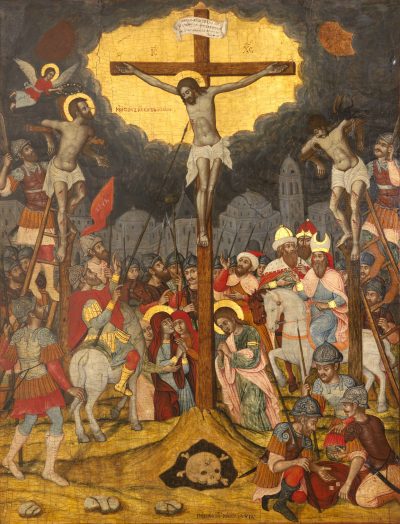 Readings:
Readings:
2 Samuel 5:1–3
Psalm 122:1–5
Colossians 1:12–20
Luke 23:35–43
Week by week, the Liturgy has been preparing us for the revelation to be made on this, the last Sunday of the Church year.
Jesus, we have been shown, is truly the Chosen One, the Messiah of God, the King of the Jews. Ironically, in today’s Gospel we hear these names on the lips of those who don’t believe in Him—Israel’s rulers, the soldiers, a criminal dying alongside Him.
They can only see the scandal of a bloodied figure nailed to a cross. They scorn Him in words and gestures foretold in Israel’s Scriptures (see Psalm 22:7–9; 69:21–22; Wisdom 2:18–20). If He is truly King, God will rescue Him, they taunt. But He did not come to save Himself, but to save them—and us.
The good thief shows us how we are to accept the salvation He offers us. He confesses his sins and acknowledges he deserves to die for them. And he calls on the name of Jesus, seeking His mercy and forgiveness.
By his faith he is saved. Jesus “remembers” him—as God has always remembered His people, visiting them with His saving deeds, numbering them among His chosen heirs (see Psalm 106:4–5).
By the blood of His cross, Jesus reveals His Kingship—not in saving His own life, but in offering it as a ransom for ours. He transfers us to “the kingdom of His beloved Son,” as today’s Epistle tells us.
His kingdom is the Church, the new Jerusalem and House of David that we sing of in today’s Psalm.
By their covenant with David in today’s First Reading, Israel’s tribes are made one “bone and flesh” with their king. By the New Covenant made in His blood, Christ becomes one flesh with the people of His kingdom—the head of His body, the Church (see Ephesians 5:23–32).
We celebrate and renew this covenant in every Eucharist, giving thanks for our redemption, hoping for the day when we too will be with Him in Paradise.














